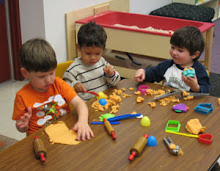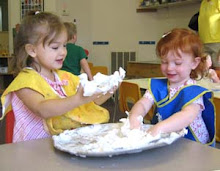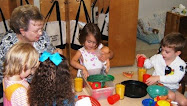Piaget’s first stage of development is called the Sensorimotor stage. This developmental stage starts at the very beginning of life and continues until the individual is about 2. Sensorimotor aged children can be described to “think with their eyes and hands” (Berk, 2003, p.227) or in other words, children at this stage heavily rely on their senses to gain cognitive knowledge and ideas.
Through active exploration, children at this level also develop both gross and fine motor skills quite rapidly. Piaget believes that these skills ultimately help children create permanent mental representations for objects (Dimitriadis, 2006). Representations are also achieved by “repeating schemes to strengthen chance” (Berk, 2003, p.227). For example a child may realise that by making a movement with their mouth, a re-occurring sound appears. These small developments are firstly aimed inward, using the child’s own body parts, then gradually outward to the surrounding environment (Berk, 2003).
Another characteristic of the sensorimotor stage can be seen as children develop “intentional or goal related behaviour” (Berk, 2003, p.227). This occurs when certain actions create certain responses. For example, this can be seen when infants realise that when they cry someone will come to their aid. Toward the end of this stage, a child will have developed enough knowledge to develop simple solutions to certain problems they may have such as finding an object that has been moved out of sight.
Through active exploration, children at this level also develop both gross and fine motor skills quite rapidly. Piaget believes that these skills ultimately help children create permanent mental representations for objects (Dimitriadis, 2006). Representations are also achieved by “repeating schemes to strengthen chance” (Berk, 2003, p.227). For example a child may realise that by making a movement with their mouth, a re-occurring sound appears. These small developments are firstly aimed inward, using the child’s own body parts, then gradually outward to the surrounding environment (Berk, 2003).
Another characteristic of the sensorimotor stage can be seen as children develop “intentional or goal related behaviour” (Berk, 2003, p.227). This occurs when certain actions create certain responses. For example, this can be seen when infants realise that when they cry someone will come to their aid. Toward the end of this stage, a child will have developed enough knowledge to develop simple solutions to certain problems they may have such as finding an object that has been moved out of sight.





